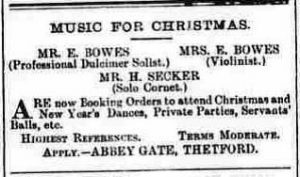Ernest Bowes (1871-1904)
One name that cropped up in newspaper reports over and over again was Mr E.G. Bowes of Thetford. Throughout the 1890s he played solo, with his wife and with a string band for community concerts and after-dinner entertainments for the Fire Brigade and other groups. He was a music teacher, although this advertisement from 1896 might perhaps suggest aspirations to perform more widely.

Ernest George Bowes was born in Dickleburgh, the son of the village police constable, but by the age of 19 he was married with two young sons and living in Heigham in Norwich where he was teaching music. He and his wife went on to have seven children in quick succession and by October 1892 he had moved to Thetford.
In 1893 he formed a concert party and in February 1894 ‘Mr Bowes’ String Band’ played for the Fire Brigade dinner (a regular annual engagement for Bowes). On that occasion, among songs and violin solos from members of the Fire Brigade, Bowes’ band played:
-
- Valse – Morning Glory
- Schottische – Coquette
- Dulcimer Solo
- March – Atlantic
- Gavotte – My Queen
- Schottische – Ally Sloper
- Polka – Little Pet
- Duet with Mr Moyes on violin
A month later, the annual Co-operative Society tea came round and the programme included the same march and waltz, a violin and dulcimer duet by Mr & Mrs Bowes, and the polka On the Green. (Bury Free Press 3.2.1894 and 3.3.1894).
His wife, Susannah Maria, was also a musician, playing the violin, and two of his sons, Reginald and Harold also performed as children. A newspaper report from 1911 records that Harold also went on to play the dulcimer.
Ernest Bowes led a busy musical life which changed abruptly in his early thirties when he contracted TB. He died shortly after his 34th birthday, in October 1904 at the Norfolk County Lunatic Asylum (later St Andrew’s) in Postwick, on the outskirts of Norwich. His occupation was given as Attendant and the family were living in a cottage attached to the Asylum. This was not, as might seem at first sight, a total change in career, as he was very probably employed in a musical capacity: in 1862 the medical Superintendent of the Asylum had formed an orchestra of staff and patients which played, often with specially scored music until about 1930. We know of one more member of the band in Bowes’ time there, Charles Waterson, who played the clarinet and was an employee at the Asylum. In the 1980s, when the asylum was closed down and cleared out, a pile of music was found which eventually found its way to internationally known violinist David Juritz, who was involved in a BBC Radio 4 programme “The Asylum Band” in 2006. Subsequently the existence of this band has inspired the foundation of the Sing Your Heart Out foundation and other mental health arts projects.
I have not found an obituary for Ernest Bowes, but this newspaper item shows how talented he was and why his choice of the dulcimer as his solo instrument was so popular with audiences.

All material on this website is copyright. Anyone wishing to quote or use this original research should credit it to Katie Howson and cite this website as the source. Please see our Terms and Conditions page for more information, and do contact me if you wish to use any of the contents in any way. Thank you.
